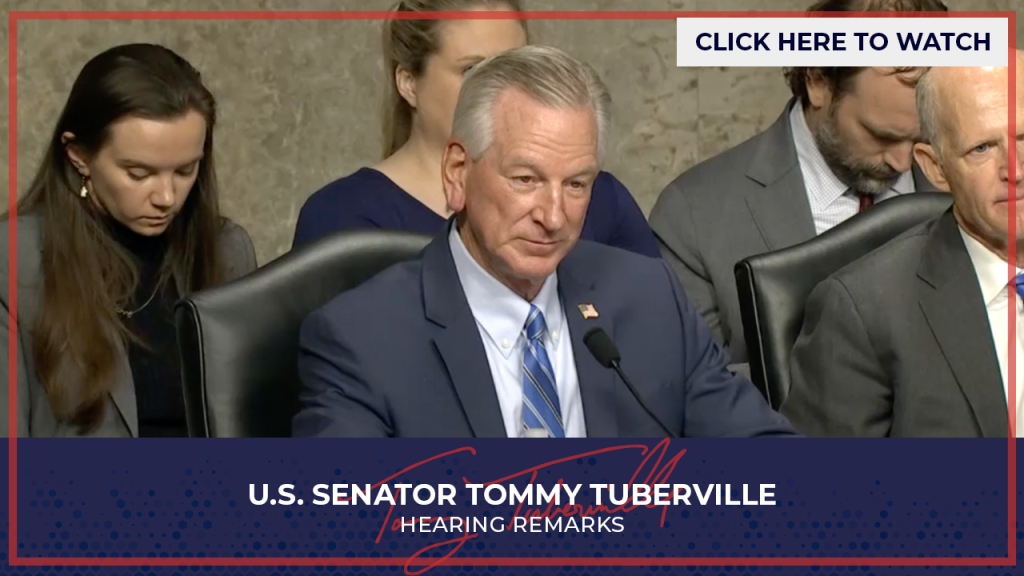WASHINGTON – Today, U.S. Senator Tommy Tuberville (R-AL) participated in a U.S. Senate Armed Services (SASC) Committee hearing to consider the nominations of Marc J. Berkowitz, Joseph S. Jewell, James R. Caggy, and Brendan P. Rogers, President Trump’s nominees to be Assistant Secretary of Defense for Space Policy, Assistant Secretary of Defense for Science and Technology, Assistant Secretary of the Defense for Mission Capabilities, and Assistant Secretary of the Navy for Energy, Installations and Environment, respectively. Senator Tuberville spoke with Mr. Berkowitz about the need to review our current space strategy to ensure it meets today’s current national security demands.
Excerpts from Senator Tuberville’s conversation with these nominees can be found below, or viewed on YouTube or Rumble.

TUBERVILLE: “Good morning, gentlemen. Thanks for your service. Mr. Rogers—our military construction process is a disaster. It’s plagued by poor initial planning cost overruns, delays that do nothing but cost taxpayers money and readiness for our troops. I’ve seen it big time in my state of Alabama. You know, a quarter of the 598 MILCON projects underway in 2023 were delayed for a year or more. Something is clearly broken. If confirmed, as regards to the Navy, do you have any answers to this disaster?”
ROGERS: “Senator Tuberville, MILCON’s obviously a critical program. We’re spending billions of dollars to support the infrastructure and as we’ve talked about, the installations are the area in which we power project and so getting that right is important. I mentioned in my opening statement the concept of fiduciary responsibility. I think that applies here for the dollars that are spent. There’s a collective interest in getting the most out of those dollars. So, if confirmed, certainly we’ll be looking into this. The specific areas of interest are a couple of things. One, what is really driving the premium that we are always paying in MILCON certainly relative to commercial opportunities? I understand some of the drivers of that. I’d like to understand that more and also welcome Congress’ help in potentially changing some of the elements of the Unified Facilities Criteria to maybe lower that cost. That’s number one. Number two is schedule and with schedule comes cost come from the commercial side. If you’re building in the commercial side, you care about schedule, cost, and your reputation, and you manage those very, very closely and specifically around how do you manage the risk of projects. So, if confirmed, I look forward to spending more time with NAVFAC and CNIC on these issues.”
TUBERVILLE: “Yeah. We’ve visited with the Secretary of War and several other secretaries and chief of staffs in the military, and they all agree. There is a huge problem. So, hopefully, we can rectify that and help our troops and save some money. I know in our state of Alabama, we have gone to more privatization instead of MILCON, and so it’s worked well in terms of speed and cost. Mr. Berkowitz, in 2020, the department released the defense space strategy, the first and last report of its kind. While other reports have come out of the DOD on space-related topics such as the 2024 report on commercial space strategy. It has been over five years since we’ve seen a department-wide strategy report. Are you aware of the strategy released in 2020 and do you believe the strategy should be updated?”
BERKOWITZ: “Thank you for raising this topic, Senator, and I must say I appreciated the time to meet with you and your staff in your office. Given the time that’s passed, I think it is entirely appropriate to review and update the department’s commercial strategy. In fact, I would note that there are three commercial strategies, one for the defense department, one for the Space Force itself, and one also for U. S. Space Command, and if confirmed, I would want to review them and ensure that they are appropriate to today’s security environment.”
TUBERVILLE: “Thank you. Mr. Jewell, Huntsville, Alabama’s major hub for innovations, hypersonics, space warfare, quantum computing, just to name a few. I don’t I don’t need to tell you we’re already years behind our adversaries in a lot of these critical technologies. What will you do to accelerate the testing and evaluation of critical technologies especially if threats from adversaries like China continue to mature?”
JEWELL: “Senator, that’s absolutely correct that our peer and near peer adversaries have invested heavily in this kind of technology. We have a number of programs in the United States such as MACH-TB, which seek to increase the pace of flight test opportunities to close that gap. But I think that we need to be vigilant with that and if confirmed, I will seek to ensure that those investments continue to be made.”
TUBERVILLE: “Thank you. Mr. Caggy, the most important part of the national defense is the warfighter. I think most of us agree with that. Most of us joined this panel to ensure the men and women who put their lives on the line every day are provided with nothing short of the best to dominate their enemy. The junior enlisted service members will be the ones working every day hands on with the capabilities that you give them. What emphasis will you put on the feedback from these young warfighters?”
CAGGY: “Senator, I completely agree with you. The feedback we get from our junior enlisted, our NCOs, is really the most important because they’re the ones that have to take the capabilities that we give them into combat and if confirmed, I’m fully committed to ensuring that all service members are represented in how we gain feedback on prototypes and experiments and that the concepts and capabilities that we deliver to them are ready to go for combat.”
TUBERVILLE: “Thank you. Thank you, Mr. Chairman.”
Senator Tommy Tuberville represents Alabama in the United States Senate and is a member of the Senate Armed Services, Agriculture, Veterans’ Affairs, HELP and Aging Committees.
###